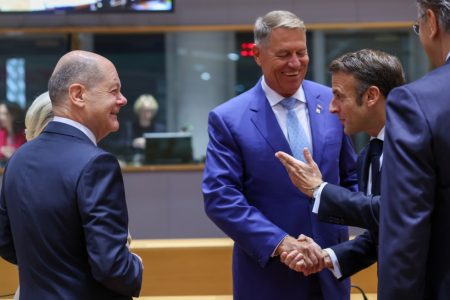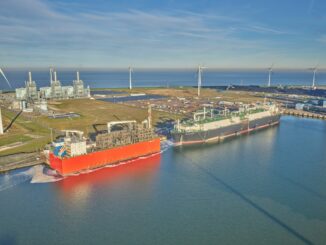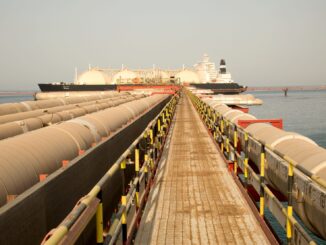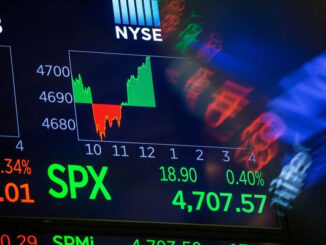
The Franco-German engine needs an overhaul to adapt to the realities of today’s Europe. These two very different sources of power can still move Europe forward – but they need to be better coordinated, write Mathieu Droin and Gesine Weber.
Mathieu Droin is a visiting fellow at the Center for Strategic and International Studies (CSIS). Gesine Weber is a visiting scholar at Columbia University.
In a recent encounter on social networks, French President Emmanuel Macron received the following question: “Is the Franco-German couple still alive?”.
To answer, Macron invited his German counterpart Olaf Scholz to record a short video, in which the latter responded in French: “I confirm, long live the Franco-German friendship” and tweeted “oui!”. Macron backed him up in German, with a clear and unambiguous “Ja!”.
We can expect more of these orchestrated displays of closeness when Macron heads to Berlin this weekend, for a repeatedly postponed state visit.
But accolades will not make up for the lack of a shared long-term vision for Europe on critical questions such as industrial policy, energy, or defence.
Disagreements have been all too obvious, with some of them being embarrassingly public, for instance, when Macron mocked Germany’s hesitations to provide Ukraine with critically needed equipment and unilaterally declared Europeans should “not rule out” sending troops to Ukraine.
Scholz promptly and sharply refuted the idea, calling on Paris to talk less and do more for Ukraine.
The poor atmospherics between the two do not do justice to the depth and breadth of the Franco-German partnership.
Foreign or defence ministers seem to have fruitful and confident working relationships, while progress has recently been made on major, long-stalled, joint defence projects such as the Main Ground Combat System of the Future Combat Air System (FCAS), showing that Franco-German cooperation is still possible.
However, this is far from the leadership that Europe needs now, which would be a clear vision for the future of the European security order, and more broadly, for European sovereignty in times of uncertainty.
Both France and Germany see themselves as natural leaders for Europe – but they pull in different directions. As Macron put it in his recent Sorbonne II speech: “The era when Europe bought its energy and fertilisers from Russia, had its goods manufactured in China, and delegated its security to the US, is over”.
Many saw this as a direct criticism of the German model: Berlin has severed ties with Russia, under duress but still efficiently; seems less enthusiastic on China “de-risking”; and clearly sees things differently when it comes to Washington, whose commitment to European and German security remains a prime foreign policy objective for Berlin.
Crucially, there is less appetite for a Franco-German leadership in Europe from other European capitals than before. Due to their lack of leadership on Ukraine, France and Germany have both lost credibility among many European countries.
Others, mainly Central and Eastern European as well as EU institutions have stepped in, and aspire to have a bigger say in charting the continent’s course.
But while the Franco-German engine might be less desired, it remains the best Europe has, with both being military and economic powerhouses. Experience has shown that when the two find a consensus on key questions, it will likely become a good basis for European common ground.
Yet, just because this method worked in the past, it does not mean it still works today.
The Franco-German engine needs an overhaul to adapt to the realities of today’s Europe: it must become hybrid. This means acknowledging that, in the current form, Europe will find in France and Germany two very distinct sources of power; which can still move the continent forward if they coordinate and synchronise.
Berlin and Paris should come up with a plan for Ukraine by combining their respective military and economic strengths. Both countries have embraced the concept of a ‘European pillar in NATO’, which is helpful but still ill-defined.
But they should not refrain from taking initiatives, but commit to at least inform each other, to avoid generating counterproductive frustrations.
The unconcerted launch by Paris of the European Political Community, or by Berlin of the European Sky Shield Initiative, show that both are willing to take initiative, but could be more efficient if concerted upstream.
Furthermore, to make sure that the Franco-German engine does not sputter, it must increasingly include other promising sources of power for Europe and especially Poland as the eastern Europe demographic and soon-to-be military heavyweight.
The window of opportunity is now open, as the country just elected a government eager to play an active role, by European rules. The recent reunions of the foreign ministers in the Weimar Triangle format seem encouraging, and should also be pursued at the highest level.
Beyond the EU, and particularly in the field of European security, the Franco-German couple should also aspire to revive the E3 format together with the United Kingdom. Especially, should the Labour party win the next UK elections in July, this might be another window of opportunity.
A new E4 format – with Poland and the United Kingdom – could potentially emerge.
Lastly, a hybrid Franco-German engine also needs much better communication about its achievements.
In the last years, many joint initiatives in global governance have been launched, yet often being overshadowed by disagreements.
A most recent example is the humanitarian conference on Sudan – organised by France, Germany, and the EU – which went largely unnoticed despite being a concrete example of fruitful cooperation, also with players outside the EU.
Most importantly, it is the timing that matters – it has to be reflected in the priorities of the state visit and beyond.
In the current geopolitical environment, the number one priority must be resolute support for Ukraine, not only in terms of political messages, but also in terms of concrete action and support.
This needs courageous action and political will – because the best hybrid engine is useless if the co-pilots do not agree on the destination.
Source:



